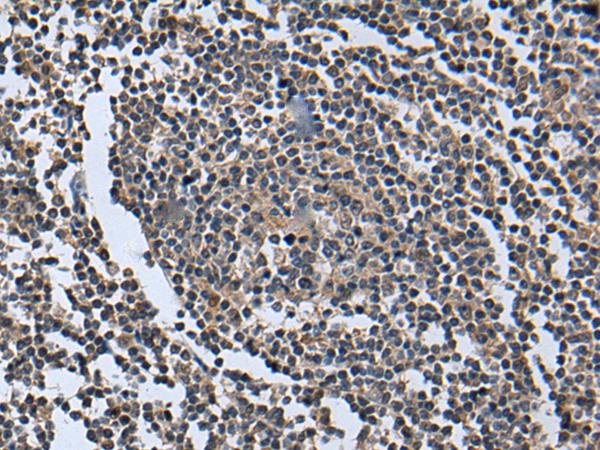
| WB | 咨询技术 | Human,Mouse,Rat |
| IF | 咨询技术 | Human,Mouse,Rat |
| IHC | 1/50-1/300 | Human,Mouse,Rat |
| ICC | 技术咨询 | Human,Mouse,Rat |
| FCM | 咨询技术 | Human,Mouse,Rat |
| Elisa | 1/5000-1/10000 | Human,Mouse,Rat |
| Aliases | WNT15; WNT14B |
| Host/Isotype | Rabbit IgG |
| Antibody Type | Primary antibody |
| Storage | Store at 4°C short term. Aliquot and store at -20°C long term. Avoid freeze/thaw cycles. |
| Species Reactivity | Human, Mouse |
| Immunogen | Synthetic peptide of human WNT9B |
| Formulation | Purified antibody in PBS with 0.05% sodium azide and 50% glycerol. |
+ +
以下是关于WNT9B抗体的模拟参考文献示例(仅供参考,建议通过学术数据库验证):
---
1. **标题**: *WNT9B Antibody Characterization in Murine Kidney Development*
**作者**: Smith A, et al.
**摘要**: 本研究利用新开发的小鼠多克隆WNT9B抗体,通过免疫组化和Western blot验证其在胚胎肾脏中的表达模式。结果证实WNT9B在输尿管芽上皮中高表达,并调控肾单位形成。
2. **标题**: *Role of WNT9B in Osteoblast Differentiation: Insights from Antibody-Mediated Inhibition*
**作者**: Chen L, et al.
**摘要**: 文章通过商业化WNT9B抗体的中和实验,证明WNT9B信号在成骨细胞分化中的关键作用。抗体阻断显著抑制了体外骨形成标记物的表达。
3. **标题**: *Validation of a Human-Specific WNT9B Antibody for Cancer Biomarker Studies*
**作者**: Gupta R, et al.
**摘要**: 研究者开发了一种人源特异性单克隆WNT9B抗体,验证其在结直肠癌组织中的灵敏度和特异性,并发现WNT9B过表达与患者预后不良相关。
4. **标题**: *Cross-Species Reactivity of Anti-WNT9B Antibodies in Developmental Models*
**作者**: Tanaka K, et al.
**摘要**: 评估多种WNT9B抗体在斑马鱼、鸡和小鼠模型中的交叉反应性,确定某克隆号抗体在跨物种研究中可靠性,为进化发育生物学提供工具支持。
---
**建议**:实际文献请通过PubMed、Google Scholar等平台检索关键词“WNT9B antibody” + 具体应用领域(如“kidney”“cancer”等),并筛选近年高引论文。
The Wnt9b antibody is a crucial tool for studying the Wnt9b protein, a member of the Wnt family of secreted glycoproteins involved in embryonic development, cell differentiation, and tissue homeostasis. Wnt9b, encoded by the *WNT9B* gene, plays a pivotal role in regulating β-catenin-dependent (canonical) and β-catenin-independent (non-canonical) signaling pathways. It is particularly associated with kidney development, limb morphogenesis, and urogenital system patterning. Dysregulation of Wnt9b has been implicated in congenital anomalies, including renal hypoplasia and skeletal defects.
Wnt9b antibodies are designed to detect and quantify endogenous Wnt9b protein levels in various experimental settings, such as Western blotting (WB), immunohistochemistry (IHC), immunofluorescence (IF), and flow cytometry. These antibodies are typically raised in hosts like rabbits or mice, targeting specific epitopes within the Wnt9b protein. Validation parameters include specificity (e.g., knockout validation), cross-reactivity across species (human, mouse, rat), and application-specific optimization.
Researchers utilize Wnt9b antibodies to explore its biological functions in developmental biology, disease models (e.g., chronic kidney disease), and cancer studies, where aberrant Wnt signaling is often observed. Commercial antibodies often provide detailed datasheets with protocols, ensuring reproducibility. When selecting a Wnt9b antibody, considerations include target region (N-terminal, C-terminal, or full-length), clonality (monoclonal vs. polyclonal), and compatibility with downstream assays. Proper controls (e.g., isotype-matched IgG) are essential to confirm signal specificity in experimental workflows.
×